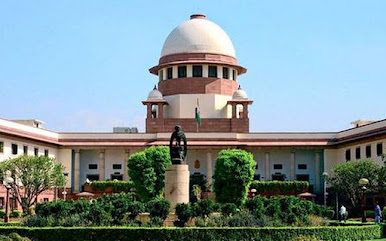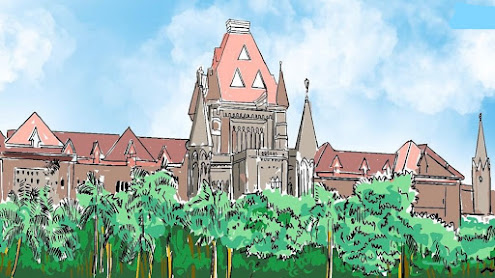A contempt petition is filed in Supreme Court against the Delhi High Court Judge C. Hari Shankar, Acting Chief Justice Vipin Sanghi and others for passing unlawful mask mandates and acting against the binding precedents of the Supreme Court.
A contempt petition is filed in Supreme Court against the Delhi High Court Judge C. Hari Shankar, Acting Chief Justice Vipin Sanghi, and others for passing unlawful mask mandates and acting against the binding precedents of the Supreme Court. [Contempt Petition bearing Provisional Id No. 12961 of 2022]
The prayers in the petition are as under;
(i) to record a finding
that Justice C. Hari Shankar is guilty of Contempt of Constitution Bench
judgment in Campaign for Judicial
Accountability and Reforms v. Union of India (2018) 1 SCC 196, Mineral
Development Ltd v. State of Bihar (1960) 2 SCR 609, and other binding
judgments for taking suo-moto cognizance when it is prohibited for any Judge
except Chief Justice and acting as a Judge in his own case;
(ii) to record a finding that
the Respondent No. 2 to 4 i.e. Justice Vipin Sanghi and others are guilty of
Contempt of binding precedents in Mamta Mohanty’s case (supra) and
other judgments where they were bound to discontinue the illegality and stop
further contempt but they perpetuated it and therefore they are guilty of
contempt as per law laid down in In
Re: M.P. Dwivedi (1996) 4 SCC 152;
(iii) to record finding that
the concerned advocates (ASG) are also guilty of not bringing the correct legal
position to courts notice;
(iv) to record a finding that
the Respondent No. 5 D.G.C.A. and other authorities are also guilty of offences
of perpetuating contempt and illegality;
(v) to record a finding that
Respondent No. 1 to 5 are guilty under section 52 of IPC for not acting in good
faith and bringing mask mandates without jurisdiction and against the
scientific evidence which suggests that wearing mask by the healthy people
causes much damage to their life than the corona, and it provides no guaranteed
protection from Covid-19;
(vi) to take action under
section 2(b), 12 of Contempt of Courts Act, 1971 r/w Article 129, 142 of the
Constitution of India;
(vii) to try and punish
Respondent No. 1 to 5;
(viii) pass appropriate
direction to Union of India to frame rules for fixing duty and responsibility
of CBI, CVC for suo-moto cognizance and investigation of offences under section
218, 219, 166, 220, 120(B), 34 etc., of IPC committed by the Judges of
Constitutional Court;
(ix) Pass any other order
which this Hon’ble Court deems fit and proper in the facts and circumstances of
the case.
The Respondents in the said petition are as
follows;
1. Shri. Justice C. Hari Shankar
2. Shri. Justice Vipin
Sanghi
Acting Chief Justice, Delhi High Court
3. Shri. Justice Sachin Datta
4. Shri. Justice Navin Chawla
5. Director General Of Civil Aviation
6. Central Vigilance Commission
7. Director of C.B.I. …Respondents
The Synopsis of the said petition is as under;
1. The present Contempt petition is filed under Section 3 of the rules to regulate proceedings for Contempt of Supreme
Court, 1975 read with Article 32 r/w 129 & 142 of the Constitution
of India for taking action of contempt against Respondent No. 1 to 5 for their
wilful disregard and defiance of binding precedent and specific direction
issued by this Hon’ble Court
2. Respondent No.1 is a
Judge at Delhi High Court.
3. On 08.03.2022 Respondent No.1 took suo moto cognizance of
contempt for the alleged act of public not wearing a mask on a flight from
Kolkata to Delhi. On the very same day Respondent No. 1 issued some directions
thereby mandating the wearing of mask by all passengers. The said directions
are without jurisdiction and issued in contempt of binding precedents of this
Hon’ble Court.
The directions are also against the scientific
research and recommendation of Health Experts and the Government of India that
the Healthy people should not wear the mask. Research had shown that the mask
cannot provide guaranteed protection from infection but causes much damage to
the lungs and put the life of the said person in danger than Covid 19. Hence,
the arbitrary exercise of power by Respondent No. 1 is also causing harm to the
common people.
4. Cognizance taken by
Respondent No. 1 vide order dated 08.03.2021
is a gross violation of law and against the binding precedent of this Hon’ble
Court judgment in the case of (i) In
Re: C.S. Karnan (2017) 7 SCC 1, (ii) State of Rajasthan v. Prakash Chand (1998)
1 SCC 1, (iii) Davinder Pal Singh Bhullar (2011) 14 SCC 770.
The law settled by this
Hon’ble Court is clear that no one can be a Judge in his own case. And suo moto
cognizance of PIL cannot be taken by any individual Judge except Chief Justice.
It is further ruled by this Hon’ble Court V.K. Naswa v. Home Secretary, UOI &
Ors. (2012) 2 SCC 546.
It is ruled as under;
“10. In Union of India v. Deoki
Nandan Aggarwal [1992 Supp (1) SCC 323: 1992 SCC (L&S) 248: (1992) 19
ATC 219: AIR 1992 SC 96], this Court similarly observed: (SCC p. 332, para 14)
“14. … It is not the duty of the court either
to enlarge the scope of the legislation.… The
court cannot rewrite, recast or reframe the legislation for the very good
reason that it has no power to legislate. The power to legislate has not been
conferred on the courts.”
14. In Union of India v. Prakash
P. Hinduja [(2003) 6 SCC 195 : 2003 SCC (Cri) 1314 : AIR 2003 SC 2612] ,
this Court held that if the court issues a direction which amounts to
legislation and is not complied with by the State, it cannot be held that the
State has committed the contempt of court for the reason that the order passed
by the court was without jurisdiction and it has no competence to issue a
direction amounting to legislation.
15. The issue involved herein was
considered by this Court in University of Kerala v. Council of
Principals of Colleges [(2010) 1 SCC 353 : AIR 2010 SC 2532] . The Court
elaborately explained the scope of separation of powers of different organs of
the State under our Constitution; the validity of judicial legislation and if
it is at all permissible, its limits; and the validity of judicial activism and
the need for judicial restraint, etc. The Court observed: (SCC p. 361, para 13)
“13. … ‘19.
At the outset, we would say that it is not possible for this Court to give any
directions for amending the Act or the statutory rules. It is for Parliament to
amend the Act and the rules.’ [Ed.: As observed in Union of India v. Assn.
for Democratic Reforms, (2002) 5 SCC 294, p. 309, para 19.]”
5. This Hon’ble Court in the catena of decisions have ruled that the
judges who are acting in disregard and defiance of the binding precedents shall
be punished under contempt and also under provisions of Indian Penal Code.
Relied On:
(i) Re:
C.S. Karnan (2017) 7 SCC 1
(ii) Barad
Kanta Mishra v. State of Orissa (1973) 1 SCC 446
(iii) Re:
M.P. Dwivedi (1996) 4 SCC 152
(iv) Somabhai Patel (2001) 5 SCC 65
(v) K. K. Dhawan (1993) 2 SCC 56
(vi) R.R. Parekh Vs. High Court of Gujrat (2016) 14 SCC 1
(vii) K. Ram Reddy Vs.
State of A.P. & Anr. 1998(3) ALD 305
(viii) K. Veeraswamy Vs. Union of India and others (1991) 3 SCC 655
(ix) Raman Lal vs State 2001 cri. L. J. 800
(x) Jagat
Patel v. State of Gujrat 2016 SCC Online Guj
4517
(xi) Smt. Justice Nirmal Yadav v. C.B.I. 2011 (4) RCR (Criminal) 809
6. The Respondents No. 2 to 4 who presided the bench subsequently are also guilty of contempt. They instead of dropping said illegal proceedings again perpetuated the contempt by continuing the illegality and therefore they are guilty of contempt of binding precedents in (i) Campaign for Judicial Accountability & Reforms v. Union of India (2018) 1 SCC 196, (ii) State v. Mamta Mohanty (2011) 3 SCC 436, (iii)Chairman cum Managing Director, Coal India Limited v. Anata Saha (2011) 5 SCC 142, (iv) V.K. Naswa v. Home Secretary, UOI & Ors. (2012) 2 SCC 546.
7. Hence, the present Contempt petition is filed with
the prayers to take action under section 2(b), 12 of Contempt of Courts Act, 1971 r/w
Article 129, 142 of the Constitution of India and pass appropriate direction to
the Union of India to frame rules for fixing duty and responsibility of CBI,
CVC for suo-moto cognizance and investigation of offences under section 218,
219, 166, 220, 120(B), 34 etc., of IPC committed by the Judges of
Constitutional Court which may kindly be allowed.
For more details, you can download a copy of the said petition by clicking the below link




Comments
Post a Comment